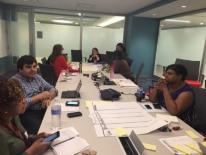
NWD Home | About | Understanding CLC | Newsletters | Feedback & Downloads | Reports
What is cultural competence? What is linguistic competence? How do you define culture? Is being linguistically competent providing translation and interpretation services? Is culture limited to race and ethnicity? What are our shared beliefs and values in becoming more culturally and linguistically competent at the “front door” to long-term services and supports? These are a few of many questions reflected and shared amongst the District’s No Wrong Door (NWD) subcommittee on Cultural and Linguistic Competence.
One of the first steps in diving into this work is to recognize that cultural and linguistic competence is a developmental process that evolves over an extended period of time – and that both individuals and organizations are at various levels of awareness, knowledge, and skills along the cultural/linguistic competence continuum. With technical assistance provided from Georgetown University’s National Center for Cultural Competence (NCCC), the subcommittee agreed that a shared definition of cultural competence and linguistic competence was necessary on which there is consensus.
Much of the foundational work of the subcommittee consisted of developing a definition for cultural and linguistic competence to be shared across agency NWD partners (i.e., Department on Disability Services, Department of Behavioral Health, Department of Human Services, DC Office on Aging, and the Department of Healthcare Finance).
Now that there is consensus, the subcommittee is utilizing the shared definition to begin a review of their agency’s policies, structures, and practices, looking for opportunities to embed principles and practices of cultural and linguistic competence. The subcommittee is also currently working on developing cultural and linguistic competency reference tools to inform and support the agencies in reframing its cultural and linguistic competency work for a No Wrong Door system.
A critical part of embedding cultural and linguistic competence within a No Wrong Door system involves partnerships and collective action to carry out this very important work. Through the DC NWD initiative, partner agencies formed a working group that meets monthly to learn, reflect, and apply cultural and linguistic competent practices within our NWD system.
Since day one, the District’s health and human services NWD agency coalesced around the vision to advance and sustain cultural and linguistic competence (CLC). We began by assessing the “front door” to long-term services and supports.
In addition, many others have joined in this effort, including the DC Developmental Disabilities Council, DC Department of Parks and Recreation, DC Language Access Program, Mayor’s Office of Veterans Affairs, DC Interagency Council on Homelessness, to name a few.
Together, we have formalized a shared definition for cultural and linguistic competence that reflects values, beliefs and attitudes in reaching cultural and linguistic competence. (Refer to attachment on the shared CLC definition.)
As we continue to move this work forward, the District’s No Wrong Door system envisions having cultural and linguistic competence embedded in policies, structures, and practices. Partnerships and collective action will continue to be key helping guide the vision for a more culturally and linguistically competent service and support system in the District – starting at the “front door.”
For more information, please contact Vivian Guerra, NWD Program Development Specialist at [email protected].


